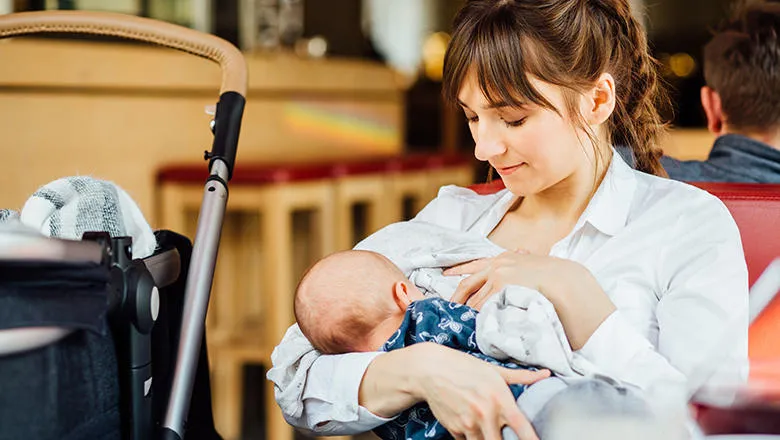10 February 2020
Breastfeeding in the House of Commons is a sign that parliament is becoming a more inclusive place to work
Sarah Childs
SARAH CHILDS: With a new set of MPs and a new Speaker, there's an opportunity to create a more open, welcoming, and supportive parliament in 2020

The Good Parliament report, published in 2016, made 43 recommendations for how to improve the UK’s House of Commons: together they would “transform who sits in the House, have the potential to significantly enhance Member effectiveness individually and collectively, improve the quality of parliamentary outcomes, and should ultimately raise the public’s regard for the House”.
If you are a careful reader, you’ll find a 44th recommendation: “infant feeding”. It has no number, but it is there. Without even a bullet point or italics, it states:
“… the issue of infant feeding is really a question of whether to permit babies into the Chamber and committees. This move would enable all Members to fully participate in House business…In addition to allowing Members to carry out their representative functions, permitting entry to infants would have symbolic benefits – showcasing the Commons as a role-model parent-friendly institution. It is accordingly recommended.”
I was very pleased to hear that the new Speaker of the House, the Rt Hon Lindsay Hoyle MP, had agreed to its occurrence, at a journalists’ lunch last month. His intervention is timely. Almost to the day – the anniversary +1 day – of the House voting to approve proxy voting for MPs on baby leave, the House – or in this instance, the Speaker – had made a bold intervention, and did so in a way that will I’m sure be welcomed by many women:
“My view is that it would be wrong of me as a male to dictate on that. If it happens, it happens. I won’t be upset by it.”
I had never really understood why some people get upset by breastfeeding. There are some jobs where holding a baby and feeding is simply not practically possible nor ideal. But much parliamentary work is about hearing what others say, and doing so for long periods of time, whether with fellow MPs, ministers, committee witnesses, and a whole host of other organisations. Holding and feeding a baby while listening and debating is absolutely doable. Some of our current MPs have fed their babies in local council chambers. For example, the SNP MP Alison Thewlis is rightly proud that she combined her political and mothering work. And in other parliaments, such as Australia’s, women members have demonstrated that breastfeeding doesn’t bring the walls crashing down. For the last couple of years, I’d secretly hoped that an MP would simply break the rule.
In The Good Parliament I had avoided using the term breastfeeding – I’d been warned by a sympathetic journalist that reporters were desperate to search the report for the term on its publication. I would not give them the satisfaction. Moreover, there are good reasons to speak of infant feeding. Not all women find breastfeeding easy, and while it may be best practice, many babies will be bottle-fed. Like all babies, MPs’ babies need feeding, and the principle of allowing this to happen whether by breast or bottle is what matters. So I look forward to MP mothers and fathers quietly getting on with this as they carry out their parliamentary work.
Hiding the recommendation in the text of The Good Parliament says rather a lot about the politics of my work in the Commons. I’d found myself – and the issue – in the newspapers well before the report was ready to be published. Along with gender-neutral toilets, the press was keen to rubbish the diversity-sensitive parliamentary reforms that I was advocating. Even so, perhaps I should have been bolder. The words of the late Jo Cox MP are worth repeating here. Responding to fears of a backlash she said:
“We should take on the popular press if it is critical and say, ’this is what women do; get over it’. It is good for children, so we should advocate it.”
Recommendation 44 was downgraded. It had to be included, of course. As a feminist I had my “red lines”. But it would be a recommendation that I would surreptitiously include to protect the reception of the report overall. I had become, during my secondment in parliament, nothing if not conscious of the pockets of personal and institutional resistance to re-gendering the Palace.
That said, much has been achieved since 2016 to make the Commons a better parliament. The Commons Reference Group on Representation and Inclusion drove the diversity-sensitive parliament agenda forward. The UK Gender-Sensitive Parliament Audit documents some of its successes. The group successfully worked with the Mother of the House, Harriet Harman; the Procedure Committee; and the Women and Equalities Chair, Maria Miller, who was also a member. With a new set of MPs and a new Speaker, the 2020 parliament must go further still to ensure that parliament is open, welcoming, and supportive to all those that work within it – MPs and staff. And there’s plenty to do in local government too, notably on maternity leave and childcare. In allowing breastfeeding so early into his tenure, Lindsay Hoyle has signalled that this agenda will continue to find the critical support it needs from those with the authority to bring about institutional change.
Sarah Childs is Professor of Politics at Birkbeck, University of London, and is a Visiting Professor at the Global Institute for Women’s Leadership, King’s College London.
